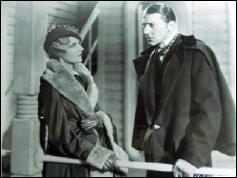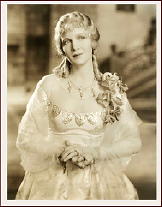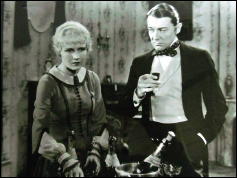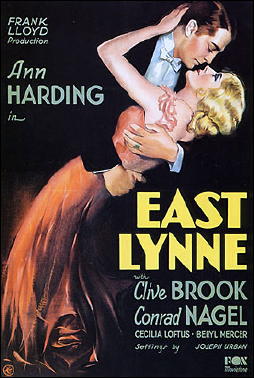Wed 14 Dec 2011
A Movie Review by Walter Albert: EAST LYNNE (1931).
Posted by Steve under Films: Drama/Romance , Reviews[5] Comments

EAST LYNNE. Fox, 1931. Ann Harding, Conrad Nagel, Cecilia Loftus, Clive Brook, O. P. Heggie, Eric Mayne, Beryl Mercer, Flora Shefffield, David Torrence. Based on the play by Mary Elizabeth Braddon, and the novel by Mrs. Henry Wood. Art director: Joseph Urban; cinematographer: John F. Seitz. Director: Frank Lloyd. Shown at Cinecon 39, Hollywood CA, Aug-Sept 2003.
A fairly sizable portion of the audience decamped after the McCarthy interview, but memories of an enjoyable silent version of East Lynne starring Theda Bara (1916) kept me in my seat for this sound remake.
The play on which both films were based was one of the most popular of Victorian melodramas. Ann Harding, as Lady Isabella, a London socialite, marries Nagel, a country solicitor.

When they arrive at Nagel’s estate, Harding finds the household managed by his sister Cornelia (chillingly played by Cecilia Loftus) and even after the birth of a daughter, the power still resides in the sister, with Harding an uncomfortable and unaccepted subordinate.
The arrival of an old friend (and former suitor) of Harding leads to her first display of opposition, an ill-advised move that results in her being sent from the house by her husband and eventually becoming the mistress of the former suitor (Clive Brook), with a life that spirals down into poverty.
The climax pulls out all the dramatic stops (blindness, a possibility fatally ill child, vindication, penance and death). I will discretely lower the curtain on the specific plot details.

Brook as the cad and Loftus as the possessive, vindictive sister gave performances that brought the film to intermittent life. Nagel’s profile was prominently featured.
I’ve always found Harding to be a very controlled actress who didn’t inspire much feeling in me about her performances. That probably worked to the film’s advantage since it reined in some of the excesses of the plot.
The film was handsomely staged (Joseph Urban was a notable production designer) and photographed. I still prefer the Bara version, but Victorian melodrama isn’t far from modern soapers, and a classy rendition still had the power to engage the sensibilities of at least some members of the audience.

Editorial Comment: This movie version of East Lynne was nominated for an Oscar as Best Picture of the Year.
December 14th, 2011 at 10:13 pm
Given the resurgence of interest in the Victorian sensation novel (Mrs. Henry Wood is now being treated very seriously by academics), it’s interesting to hear about this film (I never knew it existed). Ann Harding starred with Basil Rathbone in the 1930s film version of Agatha Christie’s “Philomel Cottage,” I think (“Love from a Stranger”).
December 14th, 2011 at 10:48 pm
While researching this post, I was amazed to see how many times the book was made into a movie.
http://www.imdb.com/find?q=east+lynne&s=all
According to IMDB, it was filmed up to 16 times, mostly in the 1920s and before, but there were two TV movies made in 1976 and 1982, respectively, both by the BBC.
Concerned Ann Harding, whose movie & TV career lasted through the early 1960s, you told me something I didn’t know, Curt: that LOVE FROM A STRANGER (aka A NIGHT OF TERROR) was based on a Christie story.
December 15th, 2011 at 7:59 am
Whenever my mother would hear something she thought was too melodramatic, she would sniff: “Next week, East Lynne!”
So this book and play became a byword for Victorian melodrama in our house.
I’ve never read it, or seen any of the films.
I like some of Mrs Henry Wood’s stories:
Abel Crew
Going Through The Tunnel
The Mystery at Number Seven (1877)
These have close ties to mystery fiction.
January 31st, 2020 at 11:33 pm
Hi! How does the film end? I couldn’t see the last 12 mins.
February 1st, 2020 at 12:00 am
Michelle
I found this from another oline review:
“East Lynne begins as an occasionally bland melodrama, but manages to avoid being completely boring. Its characters are relatively clichéd – the fun-loving wife, the conservative husband, the protective older sister who passive-aggressively makes life miserable for the newcomer. The story, too, is a tad tired – new girl, not accepted by husband’s family, tries to deal with stuffy upper class rules and etiquette. It’s definitely soap opera material.
“However, it does become engrossing towards the climax of the film. Once the stakes are raised, things start to get tense, and the picture is much more watchable. Unfortunately, though, the climax itself is a bit laughable. Isabella goes suddenly blind, but rather than stay put and wait for help, she inexplicably attempts to find her way home on her own and walks straight off a cliff.”
http://mattvstheacademy.blogspot.com/2011/01/193031-east-lynne.html
I hope this helps!